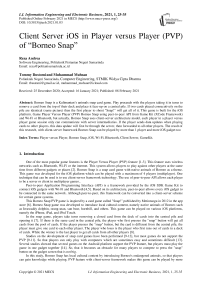Client Server iOS in Player versus Player (PVP) of “Borneo Snap”
Автор: Reza Andrea, Tommy Bustomi, Muhammad Muhsan
Журнал: International Journal of Information Engineering and Electronic Business @ijieeb
Статья в выпуске: 1 vol.13, 2021 года.
Бесплатный доступ
Borneo Snap is a Kalimantan’s animals snap card game. Play proceeds with the players taking it in turns to remove a card from the top of their deck and place it face-up on a central pile. If two cards placed consecutively on the pile are identical (same picture) then the first player to shout "Snap!"will get all of it. This game is built for the iOS platform. Game Player Versus Player (PVP) Borneo Snap using peer-to-peer API from Game Kit (XCode Framework) and Wi-Fi or Bluetooth, but actually, Borneo Snap uses client-server architecture model, each player in a player versus player game session only can communicate with server intermediaries. If the player sends data updates when playing cards to other players, this data update will first be through the server, then forwarded to all other players. The result of this research, with client-server framework Borneo Snap can be played by more than 1 player and more iOS gadget too
Player versus Player, Borneo Snap, iOS, Wi-Fi, Bluetooth, Client Server, GameKit
Короткий адрес: https://sciup.org/15017430
IDR: 15017430 | DOI: 10.5815/ijieeb.2021.01.03
Список литературы Client Server iOS in Player versus Player (PVP) of “Borneo Snap”
- Breuer, J., Pietschmann, D., Liebold, B., & Lange, B. P. (EDS.). 2018. Evolutionary Psychology and Digital Games: Digital Hunter-gatherers. Routledge.
- Schell, J. 2014. The Art of Game Design: A book of lenses. AK Peters/CRC Press.
- Glazer, J., & Madhav, S. 2015. Multiplayer game programming: Architecting networked games. Addison-Wesley Professional.
- Clayton, C. 2016. iOS 10 Programming for Beginners. Packt Publishing Ltd.
- Bourg, D. M., & Bywalec, B. 2013. Physics for Game Developers: Science, math, and code for realistic effects. " O'Reilly Media, Inc.".
- Langley, K. 2015. Learning Unity iOS Game Development. Packt Publishing Ltd.
- Wang, M., & Zhu, L. 2014. Designing and implementing an online card game based on Android 2D graphics. In 2014 International Conference on Audio, Language and Image Processing (pp. 817-821). IEEE.
- Rigal, B. 2011. Card Games for Dummies. John Wiley & Sons.
- Fachriyani, I., & Syafe'i, A. F. R. 2018. Using Karuta Game in Teaching Vocabulary to young Learners. Journal of English Language Teaching, 7(1), 32-39.
- Monaghan, J. 2016. Games: Artefacts in gameplay. In Tools and Mathematics (pp. 417-431). Springer, Cham.
- Garraffa, M., Coco, M. I., & Branigan, H. P. 2015. Effects of immediate and cumulative syntactic experience in language impairment: Evidence from priming of subject relatives in children with SLI. Language Learning and Development, 11(1), 18-40.
- Hunt, S., Letchford, C., Lloyd, M., Manning, L., & Plummer, R. 2018. The Virtue of Variety: Opening the Doors to Wider Pedagogical Practices in UK Schools and Universities. Journal of Classics Teaching, 19(38), 53-60.
- Gonsalves, T. 2019. Board Games AI. In Advanced Methodologies and Technologies in Artificial Intelligence, Computer Simulation, and Human-Computer Interaction (pp. 68-80). IGI Global.
- Andrea, R., & Kopel, M. 2018. Design and development of “battle drone” computer-based trading card game (CTCG). In International Conference on Multimedia and Network Information System (pp. 574-585). Springer, Cham.
- Brown, R., & Anderson, M. 2019. Client-Server, Unstable Theory. Computer Science and Information Technology Journal, 3(1).
- Pittman, D., & Gauthierdickey, C. 2013. Match+ Guardian: a secure peer-to-peer trading card game protocol. Multimedia systems, 19(3), 303-314.
- Yahaya, M. O. 2015. Mitigating Free Riding in Peer-To-Peer Networks: Game Theory Approach. Nigerian Journal of Technology, 34(2), 375-384.


